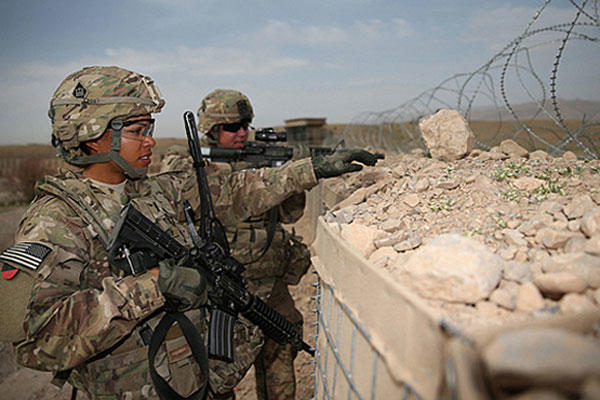The U.S. Army could have as many as 44 of the first female infantry officers by this time next year, Chief of Staff Gen. Mark Milley told Congress on Thursday.
Milley told lawmakers at a Senate Armed Services Committee hearing that the first principle in his plan to open all combat-arms jobs to women is grow female infantry leaders in these units first.
"We are going to graduate coming up in May-June timeframe from both West Point and ROTC -- I think it's 44 women that have volunteered to be infantry lieutenants," Milley said.
"If they meet all the appropriate standards -- they will go through the various infantry schools, such as BOLC, the Basic Officer Leadership Course at Fort Benning, Georgia -- they will graduate in the fall.
"They'll do follow-on training that is normal for infantry such as Ranger School, and if they continue to meet all those standards, then they will be assigned to infantry units sometime about this time next year ... you will start seeing female infantry and armor officers, non-commissioned officers and junior soldiers in those combat units."
Defense Secretary Ashton Carter reversed centuries of U.S. military tradition in December with the historic announcement that all military occupational specialties, including infantry, armor and special operations jobs, are now open to women.
Sen. Kirsten Gillibrand, D-New York, raised the concern that critics have said that the only way women will become infantry, Rangers and SEALS in real numbers is to lower standards.
"Do you plan to allow the lowering of standards and how do you plan to deal with these views from the leadership and junior personnel levels?" Gillibrand said.
"Absolutely not," Milley responded. "Standards are standards, and those standards are developed through years upon years of blood-soaked lessons learned in combat. They are neither male nor female. They are combat standards.
"If you meet the standard for combat, then you pass go, collect $200 and move on your way. If you don't, then you do something else in life."
Army leaders must guard against lowering of standards, Milley said.
"If we do that, we are actually putting at risk the unit and the women that would go into those services and potentially putting at risk the lives of their teammates as well," Milley said.
Gillibrand then asked how Milley intended to deal with the perception from personnel who believe standards are being lowered.
"How do you reinforce that these women are properly trained, are ready and have met everything and will do a great job?" she asked.
Milley said people have to be educated to ensure they understand the standards have never been lowered.
"I have heard a lot of comments about Ranger School and the three women, one of whom was a mother of two, that graduated Ranger School," Milley said.
Milley was referring to Capt. Kristen Griest, a 26-year-old military police officer from Connecticut, and 1st Lt. Shaye Haver, a 26-year-old AH-64 Apache helicopter pilot from Arizona, who became the first two women to graduate Ranger School last April. Maj. Lisa A. Jaster, a combat engineer with the U.S. Army Reserve, was a 37-year-old mother of two children when she graduated Ranger School in October.
Critics said the "standards were lowered," Milley said. "I said 'Really? Well why don't you ruck up and start walking 12 miles with 35 pounds on your back? Why don't you climb the hills of Dahlonega? Why don't you run the swamps of Florida?'
"Those standards haven't changed. Those swamps haven't changed. Those hills haven't changed. Twelve miles is still 12 miles. It's still a five-mile run in 40 minutes. Those standards haven't changed, and they met those standards."
-- Matthew Cox can be reached at matthew.cox@military.com.





























